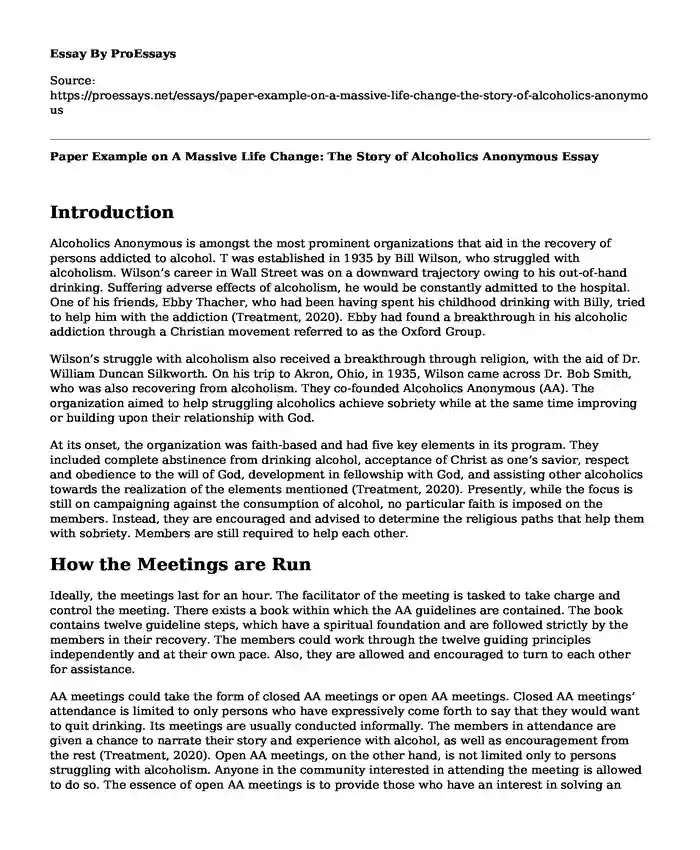Introduction
Alcoholics Anonymous is amongst the most prominent organizations that aid in the recovery of persons addicted to alcohol. T was established in 1935 by Bill Wilson, who struggled with alcoholism. Wilson’s career in Wall Street was on a downward trajectory owing to his out-of-hand drinking. Suffering adverse effects of alcoholism, he would be constantly admitted to the hospital. One of his friends, Ebby Thacher, who had been having spent his childhood drinking with Billy, tried to help him with the addiction (Treatment, 2020). Ebby had found a breakthrough in his alcoholic addiction through a Christian movement referred to as the Oxford Group.
Wilson’s struggle with alcoholism also received a breakthrough through religion, with the aid of Dr. William Duncan Silkworth. On his trip to Akron, Ohio, in 1935, Wilson came across Dr. Bob Smith, who was also recovering from alcoholism. They co-founded Alcoholics Anonymous (AA). The organization aimed to help struggling alcoholics achieve sobriety while at the same time improving or building upon their relationship with God.
At its onset, the organization was faith-based and had five key elements in its program. They included complete abstinence from drinking alcohol, acceptance of Christ as one’s savior, respect and obedience to the will of God, development in fellowship with God, and assisting other alcoholics towards the realization of the elements mentioned (Treatment, 2020). Presently, while the focus is still on campaigning against the consumption of alcohol, no particular faith is imposed on the members. Instead, they are encouraged and advised to determine the religious paths that help them with sobriety. Members are still required to help each other.
How the Meetings are Run
Ideally, the meetings last for an hour. The facilitator of the meeting is tasked to take charge and control the meeting. There exists a book within which the AA guidelines are contained. The book contains twelve guideline steps, which have a spiritual foundation and are followed strictly by the members in their recovery. The members could work through the twelve guiding principles independently and at their own pace. Also, they are allowed and encouraged to turn to each other for assistance.
AA meetings could take the form of closed AA meetings or open AA meetings. Closed AA meetings’ attendance is limited to only persons who have expressively come forth to say that they would want to quit drinking. Its meetings are usually conducted informally. The members in attendance are given a chance to narrate their story and experience with alcohol, as well as encouragement from the rest (Treatment, 2020). Open AA meetings, on the other hand, is not limited only to persons struggling with alcoholism. Anyone in the community interested in attending the meeting is allowed to do so. The essence of open AA meetings is to provide those who have an interest in solving an alcoholic problem of a friend or relative the chance to attend and benefit from the discussions. In both meetings, the members or attendees are asked to preserve the anonymity of each other, as well as respect each other’s privacy.
Personal Comments of the Meetings
The effectiveness of the online meeting was particularly impressive. How everyone was able to attend from states that are far and beyond deserves appreciation. Further, the facilitator did a spectacular job of facilitating the entire process (AAA, 2020). As such, there was appropriate turn-taking, as everyone was afforded enough time to contribute to the discussion on how the members kept encouraging each other, regardless of whether one had been sobber for a long time or sort time, was an indication of how positive the atmosphere of the meeting is. One instantly feels welcomed and supported.
Theoretical Application
The social learning theory is in play in the AA organization meetings. It was developed y Albert Bandura in the 1960s. It suggests that human beings often get into alcohol addiction as a result of modeling. Modeling attracts one to partake in behavior because they see others getting a reward or acknowledgment for it. Equally, the theory could be applied to help those seeking to recover from alcoholism (Theory, 2019). When interacting with persons who have recovered from alcohol addiction, those still suffering from its addiction get hope that they too can get to sobriety. As such, they are encouraged to push on and are inspired to cling towards sobriety.
Conclusion
AA organization is effective in the manner within which it functions. Owing to the encouragement stories from those in attendance, some are currently struggling with alcohol addiction, while others are already counting days, months, or years into sobriety. The important thing to note is that every single effort and every single second does matter. All those struggling with alcohol addiction need is support and encouragement.
References
Alcohol Anonymous Organization (2020) https://linksharing.samsungcloud.com/Ck02HVPG5RUN
Treatment. (2020, July 06). The History of Alcoholics Anonymous. Retrieved July 14, 2020, from https://www.treatmentsolutions.com/blog/the-history-of-alcoholics-anonymous/
What Does Social Learning Theory Have to Offer Alcoholics? (2019, December 02). Retrieved July 14, 2020, from https://www.uk-rehab.com/alcohol-addiction/what-does-social-learning-theory-have-to-offer-alcoholics/
Cite this page
Paper Example on A Massive Life Change: The Story of Alcoholics Anonymous. (2023, Oct 02). Retrieved from https://proessays.net/essays/paper-example-on-a-massive-life-change-the-story-of-alcoholics-anonymous
If you are the original author of this essay and no longer wish to have it published on the ProEssays website, please click below to request its removal:
- Inequality in Education in the United States
- Essay Sample on Diversity-Focused Communications: A Necessity for PR Professionals
- Immigration, Prohibition and Native Americans: Conflict and Cultural Practices - Essay Sample
- Essay Example on White Australia Policy: Immigration Restriction Act 1901
- Paper Example on Managers & Co-Workers: The Key to Quality Output
- Essay Sample on Alcohol Liver Disease: The Difficulty of Obtaining a Liver Transplant
- Race & Identity: How Morality Influences Our Decisions - Essay Example







